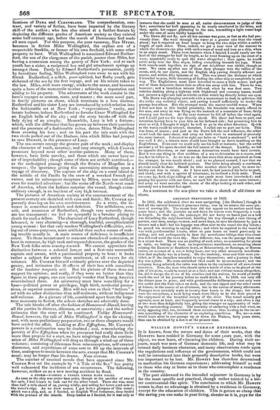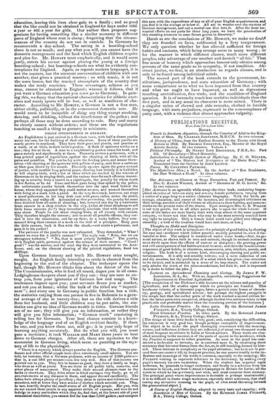WILLIAM HOWITT'S GERMAN EXPERIENCES.
IT is known, from the nature and dates of their works, that the HOWITTS have resided in Germany for some bears past, with the object, we now learn, of educating the children. During their so- journ, much was seen of German domestic life, and what may be termed daily business character, and many observations made upon the regulations and influence of the governments, which could not well be introduced into their generally descriptive books, but were too important to be lost. Mr. Ilowerr has therefore determined to methodize his German experiences; addressing himself as well to those who stay at home as to those who contemplate a residence in the country. The part addressed to the intended sojourner in Germany is by far the most specific and practical, though rather tainted by a bit- ter controversial-like spirit. The conclusion to which Mr. HOWIDE comes is, that no advantage is obtained by a residence in Germany, except for the education of children. This is gotten so cheap that the saving you can make in your living, slender as it is, pays Mr the education, leaving this item clear gain to a family ; and so good that the like could not be obtained in England for boys under 100/. a year or 80/. a year for girls. Our author then proposes sug- gestions for having something like a similar economy in different parts of England where rent is cheap; forgetting that the circum- stances of the country do not run in curricle. In Germany he recommends a day-school. The saving in a boarding-school there is not so much ; and pay what you will, you cannot have the domestic management and the food which English children require and pine for. Mr. HOWITT most emphatically, and it would seem justly, enters his caveat against placing the young at a foreign boarding-school ; but boarding-schools are what be evidently con- templates for England. Again, as regards modern languages, it is not the masters, but the constant conversation of children with one another, that gives a practical mastery : so with music, it is not the mere lesson, but the musical atmosphere of the country that makes the ready musician. These advantages, scheme as you may, cannot be obtained in England; whence it follows that if you want a German education you must go to Germany. In gain- ing this, we fancy that the national characteristics for athletic exer- cises and manly sports will be lost, as well as manliness of cha- racter. According to Mr. HOWITT, a German is not a free man, either civilly, politically, or in the commonest domestic acts. He would seem to be incapable of doing any thing except smoking, dancing, and drinking, without the interference of the police; and perhaps all those may be done according to rule. Bury and marry he clearly cannot without orders; and these are the regulations touching so small a thing as gunnery in miniature.
POLICE INTERFERENCE IN GERMANY.
An Englishman is just arrived in a German town, with half-a-dozen youths under his care, for the finishing of their education. Some of these youths are nearly grown to manhood. They have their guns and pistols, and practise at a mark, or at birds, in their tutor's garden. A flock of sparrows settles on a tree ; they fire at them. A man in a neighbouring, garden raises his head, and gazes sternly anti significantly at them. Presently arrives a policeman, with a long panted paper of regulations against the shooting of birds, with all the pains and penalties. The }oaths lay aside the fowling-piece, and amuse them- selves with shooting at the sparrows with pellets of putty, sent from a sarbacan OF blow-gun, blown by the mouth. Presently appears again the grave servant of justice, with another leog printed paper, showing how strictly it is forbidden to kill singing-birds, with a list of those which are decided by the wisdom of Government to be singing-birds, and the various tines for such offences, mount- ing up in severity from a tomtit to a nightingale, the penalty for whose death is five florins, or 8s. 4al. Guns and blow-guns being thus spiked by the police, the unfortunate youths betook themselves into the open wood behind the house, where they supposed they could molest no one, and amused themselves with firing at a mark with a pistol. At the very first crack, however, out steps a wood-policeman, in his long drab coat with green collar, seizes the pistol, pockets it, and walks off. Astounded at this proceeding, die youths for some time desisted from all sorts of shooting ; but, tempted one day by a handsome brass cannon in a shop-window in the city, (what do these shopkeepers sell little brass cannons for?) they immediately conclude that with cannons you may shoot. People do not shoot singing-birds, at all events, with cannon. They therefore bought the cannon; • and to avoid all possible offence, they car- ried -
ried t into the mountains, and far up there, in a rocky hollow, they com-
menced firing their cannon at a mark on the wall of a precipice. Bang goes the little cannon, hack it flies with the shock,—out starts a policeman, and guts it in his pocket!
The patience of the youths was now exhausted. They demanded, " What ! cannot we even fire a child's cannon ?" The reply was. " Nein, des ist am strengsten verboten." " No, that is most strictly forbidden." The youths, with English spirit, protested against the seizure of their cannon. " Good ! good !" was the answer, and the next day they were summoned to the Amt- house, and, on the clearest showing of the printed regulations, fined ten
Upon German honesty and truth Mr. HOWITT cries nought, nought. An English family intending to settle is cheated from the beginning to the end of the chapter. The innkeeper opens the ball, though Mr. HOWITT thinks him about the fairest of the lot. The Commissionaire, who is feed all round, dupes you in all cases. Lodginghouse-keepers cheat you if they can : they are sure to en- trap you, from your ignorance of German law and usage. The tradesmen impose upon you ; your servants fleece you at market, and rob you at home; whilst the bulk of the titled are " imperti- nent"; and every one in Germany in public function has a title, the statistics varying from one person in five in Bohemia to a gene- ral average of one in twenty-five; but as the wife derives a title front her husband, and little children may be put aside, the sta- tistics can give no idea of German wealth in titles. German friends are of no use; they will give you no information, or rather they will give you false information; " German truth" consisting in telling lies for Germans. Your best chance consists in a know- ledge of the language and of an English resident family. If there be one, and you know them not, still go ; it is your only hope of learning anything accurately. But do what you will, you must pass a noviciate; it took WILLIAM and MARY three years to beat down to German charges. After all, there are mysteries to the economist in German living, which seem as puzzling as the mys- tery of life to the physiologist.
" There is a mystery which always puzzles the English. The German pro- fessors and other official people have often notoriously small salaries. You are told, for instance, that a German professor, with an income of 2000, gulden— that is, aPout 180/ per annum—can live very well. Men of this income are pointed out to you. They live in houses as good, they have a family as large, who dress as well as yours. You see them at all public balls, concerts, and other places of amusement. They make their annual pleasure-tour to the baths or elsewhere. They drive about in hired carriages very freely, go to all entertaisonenta at any distance in them, and appear dressed excellently. The lidies have always plenty of jew entry ; they dress in satins and velvets on these Occasions, and at home they have stocks ot clothes which astonish you. They, in fact, heartily despise the small stores of all English people. But you, who du not exceed these people in any apparent article of expense, and who do not indulge in many particulars which they do, find that, at the lowest ebb of your economical discoveries, you cannot live for less than 7,000 gulden; and compare this sum with the expenditure of any or all of your English acquaintances, and you find it is the average or below it. All are in wonder over the mystery of German management, and not a mortal can dive into it. After the most un- wearied efforts on our parts for three long years, we leave the penetration of this standing arcanum to some future genius in discovery."
Harsh as are the conclusions of Mr. HOWITT, we make no doubt they are founded on facts, sublimated by a fiery temperament. V1'e only question whether he has allowed sufficient for foreign habits and customs, which being strange seem to many wrong ; or for the manner in which different classes, much more different peoples, take advantage of one another and deem it "all fair." That fine sense of honesty which approaches honour only obtains among persons of the same grade as to sympathy, if not condition. Ab- stract justice, we fear, is an abstraction as regards classes, and ia only to he found among individual minds. The second part of the book extends to the government, in- stitutions, jurisprudence, and state education of Germany ; with some comparisons as to what we have imported from that country and what we ought to have imported, as well as digressions touching centralization, free trade, and the condition-of-England. question. It is of necessity much less useful to individuals than the first part, and in any sense its character is more mixed. There is a singular union of shrewd and able remarks, clothed in forcible language, with mere prejudices, expressed in the cominonplaces of party cant, with a violence that almost approaches vulgarity.



























 Previous page
Previous page